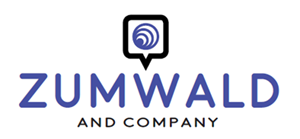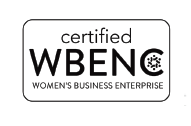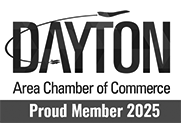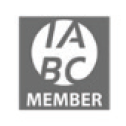Executive communications thought leadership: Carpe diem, business leaders
With business now the most trusted institution in the world, it’s time for business leaders to seize the day – to advance civil discourse, listen and then take a stand on issues that align with their corporate values.
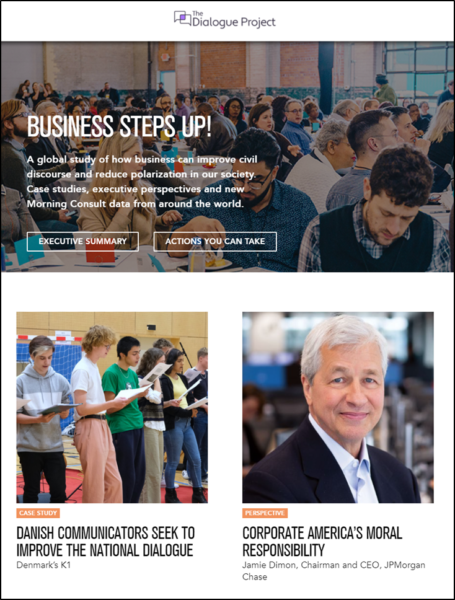
The Dialogue Project features information about how to improve civil discourse and reduce polarization.
It’s time for business leaders who may have been “waiting it out” to engage in executive communications thought leadership.
What is the role of business in helping to reduce polarization and improve civil discourse around the world?
That is the key question studied by Bob Feldman, founder of The Dialogue Project, a high-profile, CEO-supported global study.
Now available at The Dialogue Project are:
- The research results, which cover everything from the severity of the dialogue divide, to the toughest topics to discuss, to how well people believe they are bridging the gap
- Bylined articles by business leaders – like AARP CEO Jo Ann Jenkins, Walmart President and CEO Doug McMillon, and General Motors Chairman and CEO Mary Barra – who weighed in on the impact of the problem and what should be done about it
- Case studies about work already going on – at companies like Chevron and Southwest Airlines – to help improve discourse and reduce polarization
The Dialogue Project also recommends eight ways companies can take action to help move the conversation forward. Job 1 is to listen and be accountable, and that commitment starts with business leaders at the top.
Barra at GM tells her team, “Listening leads to awareness … awareness leads to dialogue, dialogue leads to understanding, and understanding leads to change.”
Feldman hopes that business leaders who’ve been reluctant to engage in discussions around difficult societal issues in the past will review The Dialogue Project’s research, articles and case studies – and be inspired to step up and do more.
Changing expectations for business
I heard directly from Feldman during an executive communications thought leadership event, ExecCommsNEXT, hosted by the Executive Communication Council, a group of serious leadership communicators working together to define, elevate and empower the practice.
Our conversation started with The Dialogue Project and evolved into a discussion about the expanded expectations of the CEO to get more engaged in society’s broader issues.
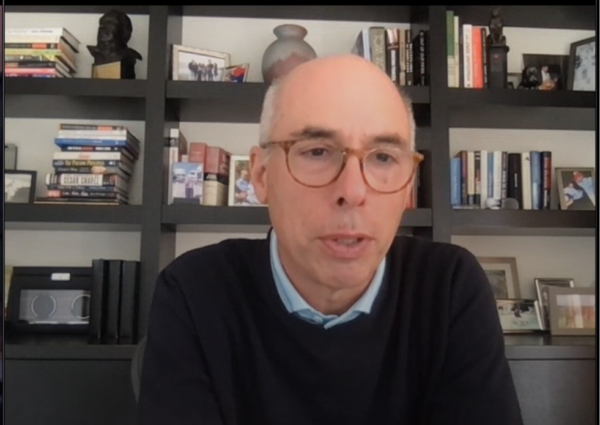
Bob Feldman is the founder of The Dialogue Project.
Why are expectations expanding?
And what is the impact on executive communications thought leadership?
According to Feldman:
- Employees today are demanding more authenticity and engagement from their employers. That is why they are pushing their CEOs to take stands on issues important in society.
- More people are recognizing the expanded role of business in society, which is now all about the stakeholder. Stakeholder capitalism is becoming more central to the future of business.
- The workplace has become the primary place where people engage most often as a group and are exposed to a diversity of thoughts and experiences.
As the world grapples with complex issues – the ones most difficult to talk about are politics, race/ethnicity and sexual orientation, according to The Dialogue Project – people are now looking to CEOs and other business leaders to help lead difficult conversations and take meaningful action.
Feldman says there is both a need – and a responsibility – for business leaders to do more than they’ve done in the past.
Baton is passed
Simultaneously, another phenomenon is now in play.
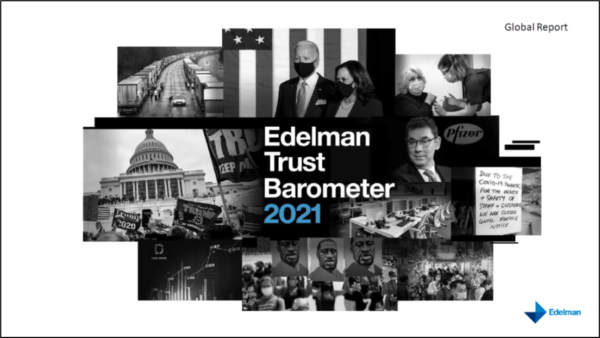 Business is now the most trusted institution – with a 61 percent trust level globally – over government, NGOs and the media, according to the Edelman Trust Barometer 2021.
Business is now the most trusted institution – with a 61 percent trust level globally – over government, NGOs and the media, according to the Edelman Trust Barometer 2021.
The Edelman report also found that business is the only institution now seen as both ethical and competent.
That may be why 86 percent of people now agree that CEOs must lead on societal issues.
In fact, people “expect CEOs to publicly speak out on one or more of these societal challenges”: the pandemic impact, job automation, societal issues or local community issues, according to Edelman.
Clearly this finding about executive communications thought leadership is more than an expectation.
It’s a mandate.
The Edelman report goes on to issue this tall order:
“The heightened expectations of business bring CEOs new demands to focus on societal engagement with the same rigor, thoughtfulness and energy used to deliver on profits.”
The call to action
When you look at The Dialogue Project and the Edelman Trust Barometer 2021 through the same lens of opportunity and the “trust capital” that now exists, I believe the call to action to business leaders is clear:
 With business now the most trusted institution in the world, it’s time for business leaders to seize the day – to advance civil discourse, listen and then take a stand on issues that align with their corporate values. It’s time for business leaders who may have been “waiting it out” to engage in executive communications thought leadership.
With business now the most trusted institution in the world, it’s time for business leaders to seize the day – to advance civil discourse, listen and then take a stand on issues that align with their corporate values. It’s time for business leaders who may have been “waiting it out” to engage in executive communications thought leadership.
However, I know more than a few leaders who may still be worried about the risk of weighing in on a broad societal issue – even if that issue is clearly connected to the organization’s values.
Feldman says the research shows there’s more risk in straddling both sides of the fence and saying nothing than actually choosing a position and taking a stand. If you straddle the fence, he says, you alienate everyone.
Leaders still not convinced may be inspired by The Dialogue Project article by Sally Susman, the executive vice president and chief corporate affairs officer at Pfizer, who wrote about the need for business leaders to “build a reputation on doing” and called on leaders to “speak out externally” since business – not government – has a greater capacity to advance civil society:
“Whether the question is about COVID-19 or racial injustice, the answer is the same: We are in this together and silence is no longer an option. In June (2020), Pfizer CEO Albert Bourla was featured in a Business Insider article on racial equity action plans and earlier in the year we allocated some of our TV ad buy for two Public Service Announcements in response to the coronavirus pandemic. Another powerful example of speaking out comes from Nike, which brilliantly pivoted its ‘Just Do It’ slogan to address racism in a new ad called ‘For Once, Don’t Do It.’”
Feldman says every business can do something to play a more constructive role in society. CEOs and business leaders only need to get more comfortable about doing so.
Listening to inform your stand
If you are a CEO or business leader who’s been silent in the past – or if you are an executive communications adviser to these CEOs and business leaders – how do you begin to weigh in?
 How can you seize this moment to advance understanding with executive communications thought leadership, which leads to change?
How can you seize this moment to advance understanding with executive communications thought leadership, which leads to change?
Listening is an important first step to get insights on key issues, inform your organization’s position, get clarity on how that position aligns with your company’s established values and then communicate that to employees, customers and other stakeholders.
Listening, of course, starts with the ability to have civil discourse.
The Dialogue Project research found that as a global society, we have a long way to go in that regard:
- Most people (82 percent) believe that people should be more respectful when talking with those with different views.
- However, fewer people (only 50 percent) said they should spend more time doing so.
- And even fewer people (only 25 percent) reported that they actually often do.
That’s where business comes in.
Corporations, universities and other organizations are making progress in civil discourse. Just look at:
- Courageous Conversations, a guided discussion series marked by open minds and respect for all, happening at General Mills
- The work of the Better Arguments Project, a method of having more productive arguments that takes “winning” off the table, happening at Allstate and other partners
 Scandinavia’s COOP/Enigma partnership, which has found that constructive dialogue usually goes better with good food, and is helping people meet, talk and connect
Scandinavia’s COOP/Enigma partnership, which has found that constructive dialogue usually goes better with good food, and is helping people meet, talk and connect
These and other stories of progress should inspire CEOs and business leaders everywhere – at organizations large and small – to begin doing something to advance conversations, which can then inform positions and points of view in executive communications thought leadership.
To this end, Feldman said CEOs and business leaders who aren’t doing the work to get more engaged in productive dialogue are “dinosaurs” on their way out.
In fact, if CEOs and business leaders don’t know how to do this, he warned, they need to learn pretty quickly.
That’s because the fate that awaits CEOs and business leaders who continue to stay silent equates to nothing less than what the dinosaurs suffered.
And that is extinction.
